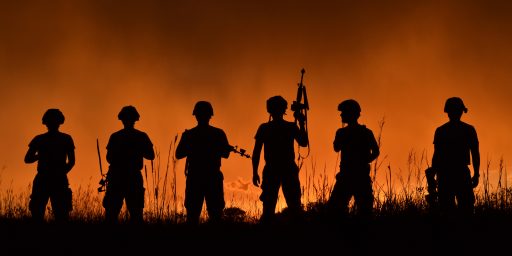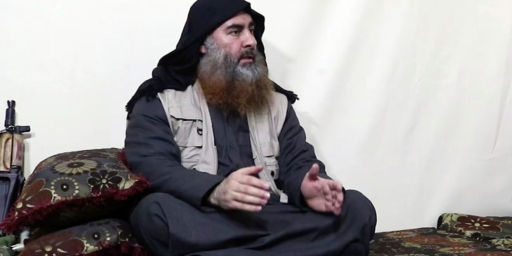Soldiers in Iraq Ignore Homefront Politics
Soldiers in Iraq are too busy doing their jobs and trying to stay alive to be pay much attention to the domestic discussion of the war, Leslie Sabbagh writes in Popular Mechanics.
It never even hits the radar screen. For the troops on the front lines and the colonels in the rear—and just about everyone in between—the big news in Iraq every day is that they’re still alive and healthy. When it comes to Senate votes on the U.S. presence in Iraq, Sunday talk shows thrashing out length of deployment and stateside pundits talking to themselves, nearly every grunt, airman, sailor, soldier and Marine I speak with just doesn’t care.
It’s not negligence or a lack of opinion about how long they think they should stay here; they’re tuned out because the news doesn’t impact their day-to-day operations—and because comms often leave them uninformed from half a world away.
War deliberations and post-firefight reactions back home can vanish during the 12-hours-a-day, seven-days-a-week base-line duty of the average soldier in Iraq. So when line troops are swamped carrying gear from street patrol to street patrol, village raid to village raid, for up to 20 hours a day, they often don’t have the time for, or the luxury of, Internet access. And when they do get it, they’re not punching up CNN—it’s e-mails from home they’re reading.
This doesn’t surprise me. Indeed,I wrote much the same thing in a piece for TCS called “Does Criticism of the War Undermine Troop Morale?” almost two years ago:
[S]oldiers in a war zone are perhaps the least attuned among us to what’s being said on television. During Desert Storm, my parents anxiously watched CNN several hours a day trying to keep up with what was going on. Meanwhile, I was focused on the mundane duties of a platoon leader, making sure my troops were taken care of and that we were ready to fire rockets down range when called upon. The only news I got was from my nightly operations briefs and from days-old copies of the Stars and Stripes when the mail got delivered.
Soldiers ultimately decide for themselves whether their mission is “worth it.” To the extent that they are concerned with political debates in Washington, it is mostly about the small picture: ensuring they get the tools and equipment they need to survive and get the job done. While they may be interested in grand strategy, it seldom motivates them to risk life and limb. They may agree or disagree with establishing a foothold for democracy in the Middle East but they fight for their comrades-in-arms, out of genuine concern for locale villagers whose situations they empathize with, and for hundreds of other reasons unique to each soldier.
Of course, today’s soldiers have the Internet and other technology that we didn’t have back in the Old Army of 1991. Still, I suspect Sabbagh’s observations — anecdotal as they are — hold true.






Indeed; this seems a rather transparent attempt to counter the argument that all of this discussion all this protest all this discontent as regards the rock war, is having A deleterious effect on their morale.
It also ignores history. Vietnam, for one.
Arrgh.
Rather than correcting the previous response, I’ll fine tune it as I go.
(Pause for coffee)
(James, you can kill the first one if you like)
I find myself being unimpressed by such arguments. They tend to ignore history. Vietnam, for one thing. The such arguments tend to get even thinner when one considers that regardless of the war having ended, troops have a tendency to come home. They end up having to face the argument then , and then have to return to where the war is, often enough.
James, that was one aspect of your service that you do not mention…. being directly exposed during leave to the discussions here at home. That’s probably a reflection of the short term nature of Desert Storm.
But here, we have a situation that stretched on for long enough that most of the people there have at least seen a couple of tours. In between those two tours, they came home, and watched with (doubtless) some degree of disbelief as the discussion raged about the validity of the Iraq war, here at home.
I find it difficult to believe that anyone’s assessment would be that the morale of our troops could be completely unaffected by such arguments.
Certainly, you’re correct that in the end, and on the whole, each individual soldier must make his own determination as to whether not our actions in Iraq are “worth it”. If I read correctly the reactions of returning soldiers, most think it is.
But I suspect that those nagging doubts raised by the arguments among amongst the people that they are supposedly representing, you’re at home, have more effect on their morale than either article you cite would let on.
You might want to read the op-ed in today’s NY Times from active duty Iraqi soldiers that suggest exactly the opposite.
Their conclusion is that the debate in Washington is “surreal” and basic assumptions about the success of Bush’s “surge” are horribly misguided.
http://tinyurl.com/yuymck